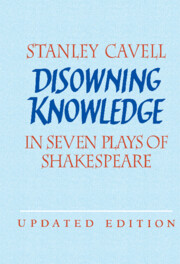Book contents
- Frontmatter
- Contents
- Preface and Acknowledgments
- Preface to the Updated Edition
- 1 Introduction
- 2 The Avoidance of Love
- 3 Othello and the Stake of the Other
- 4 Coriolanus and Interpretations of Politics
- 5 Hamlet's Burden of Proof
- 6 Recounting Gains, Showing Losses
- 7 Macbeth Appalled
- Index of Names and Titles
7 - Macbeth Appalled
Published online by Cambridge University Press: 05 June 2012
- Frontmatter
- Contents
- Preface and Acknowledgments
- Preface to the Updated Edition
- 1 Introduction
- 2 The Avoidance of Love
- 3 Othello and the Stake of the Other
- 4 Coriolanus and Interpretations of Politics
- 5 Hamlet's Burden of Proof
- 6 Recounting Gains, Showing Losses
- 7 Macbeth Appalled
- Index of Names and Titles
Summary
When a given text is claimed to work in the light, or in the shadow, of another – taking obvious extremes, as one of a given work's sources or as one of its commentaries – a measure of the responsibility of such a linking is the degree to which each is found responsive to the other, to tap the other, as for its closer attention. Macbeth is a likely work to turn to in these terms on a number of counts. Being Shakespearean melodrama, it takes up the question of responsiveness, the question, we might say, of the truth of response, of whether an action or reaction is – or can be – sensually or emotionally adequate to its cause, neither withholding nor excessive (Macbeth's to news of his wife's death, or Macduff's to his wife's and his childrens', or Macbeth's to Banquo's reappearance, or Lady Macbeth's to Macbeth's return from the wars). More than any other Shakespearean tragedy, Macbeth thematically shows melodramatic responsiveness as a contest over interpretations, hence over whether an understanding is – or can be – intellectually adequate to its question, neither denying what is there, nor affirming what is not there (a deed, a dagger). As if what is at stake is the intelligibility of the human to itself.
The question of human intelligibility takes the form, in what I want to begin to work through in Macbeth, of a question of the intelligibility of human history, a question whether we can see what we make happen and tell its difference from what happens to us, as in the difference between human action and human suffering.
- Type
- Chapter
- Information
- Disowning KnowledgeIn Seven Plays of Shakespeare, pp. 223 - 250Publisher: Cambridge University PressPrint publication year: 2003
- 1
- Cited by



